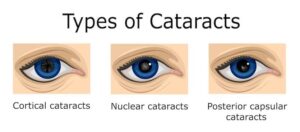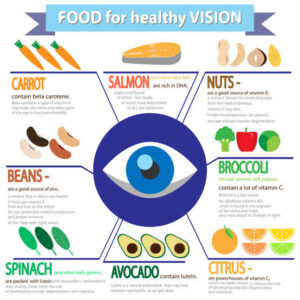Nutritional management of Cataracts
Cataracts is a medical condition involving the eyes. It is associated with clouding of the natural lens in the eye that affects vision thereby causing blurry or distorted vision, and can lead to blindness if left untreated. There are different types of Cataracts and they include; Nuclear cataracts( this involves the clouding of the center of the lens), Cortical cataracts( it is associated with the clouding of the outer lens), Posterior Subcapsular Cataracts( this is the clouding of the back of the lens of the eye), Congenital Cataract( this is present at birth), and lastly secondary cataracts which is caused by other medical conditions or medications.

Causes and Risk Factors of cataracts
- Aging
- Diabetes
- UV radiation exposure
- Smoking
- Certain medications (e.g steroids)
- Trauma or injury to the eye
- Family history
The following are the signs and symptoms of cataracts; Blurry or cloudy vision, double vision, fading or yellowing of colors, sensitivity to light and difficulty reading or watching TV.
Cataracts can be managed nutritionally and this involves consuming a balanced diet rich in nutrients that support eye health and reduce the risk of cataract formation. Nutrients that supports the eyes include; vitamin A, vitamin C, omega-3 Fatty acids, vitamin E, Zinc, selenium etc.
These nutrients have various roles it performs in managing the health of the eyes for example; food rich in vitamin C helps to protect the lens from oxidative stress, food rich in vitamin E and selenium helps to support antioxidants defense, omega-3 Fatty acids provides anti-inflammatory benefits, Zinc supports the immune function and eye health, vitamin B also plays and important role in preventing and managing the risk of cataracts.

Foods rich in these nutrients are leafy greens, berries, nuts and seeds, Fatty fish, eggs, whole grains, avocados etc. It is important to balance meals with these essential nutrients and also staying hydrated, reducing the intake of alcohol, sugar and salt, regular eye exams and medical care are essential for early detection and treatment.
Explore more on disease and how to manage them nutritionally here :DIETARY MANAGEMENT OF LIVER DISEASE�
Kindly drop comments in the comment section box 🥰






Leave a Reply